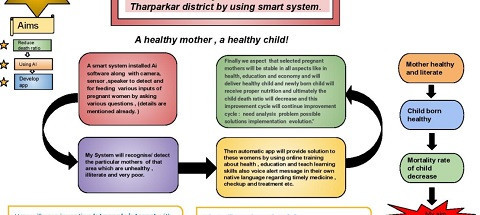
GCED Basic Search Form
Quick Search
You are here
News

466 girls from different cities, school systems and colleges are working on their Artificial Intelligence (AI) models to solve problems -related to Sustainable Development Goals (SDGs) in Pakistan.
UNESCO in collaboration with Technovation has launched an online 5-week free training on AI for girlsof age 10-18 years in six countries including Pakistan. Since the inception of the programme from 27 July 2020, it is replete with many opportunities for girls to understand and identifyproblems in their communities, and explore data with a solution to rectify the problems through the development of their own AI model.
It is a self-paced programme, where girls alone and in teams attend the weekly sessions, participate in discussions and complete their assigned tasks delivered through google classrooms. A group of mentors from technology-based industries help students with their questions, concerns, comments and provide them feedback on their assignments. To encourage students to have more urge for learning, students are given prizes each week on completion of their timely tasks especially to those who come up with novel ideas to solve their community problems.
In Pakistan, 466 girls from different levels with a diverse background have enrolled themselves in the programme. Students find the course modalities very interesting, informative and thrilling while gleefully working on their assignments along with exploring the AI around them. This led the girls to have a firm belief in themselves that they can develop their own AI models to resolve their identified issues. A student of the course Hina Khurram expressed her views,“The lessons are informative coupled with few challenges but we are determined to practice simulation exercises to get over challenges.”
Girls are actively participating in different quizzes and other activities to top up their learning and many of them also extend help to the newcomers to catch up on the previous assignments. Moreover, a group of volunteers also hold weekly meetings to support those students who are unable to fulfill their assignments on time. The contents and learning oppurtunites of the course are helping students to identify, choose and resolve their community issues through developing a tailored AI model. It is encouraging to know that young girls are fully aware and concerned about various problems in the country and they have innovative ideas to solve those problems. Some girls have selected different SDGs as their priority areas to work on for their AI, and are working on various issues including hunger and food security, education and gender equity, health care facilities, child mortality, water scarcity, environmental pollution, deforestation, cyber-bullying, child-trafficking, kidnapping, and animal rights, etc. Some girls have chosen to develop AI models on innovative problems like helping children to deal with boredom, a girl is interested to develop to help children and people with mental disorders to find their homes with the location of their shoes. Another wants to develop phone apps to help people with grocery shopping with ease and minimal time. The list goes on and on.
An anctive student, Anusha Shehzad wants to work on reducing hunger and food wastage. She is right in mentioning that there are inequalities in the distribution of food around the world. A lot of food wasted in different ways and forms, which can be saved and served to those who have difficulty accessing food.
|
Another conscious young girl is concerned about the health facilities in the country. She wants to ensure proper and timely detection of diseases and easy access to health facilities. My problem is health care. The solution I have decided on is to make an app, which will help predict if a person is not feeling well. He/she can open the app to answer a few questions and the app will predict what kind of health issue the person has. If it is a serious health problem or one needs immediate attention the app can call the hospital or emergency, said a student Haajrah Nadeem. My problem is global warming says Udaya Pandit. She wants to reduce the rise in temperatures in the world through her AI model. I want to make a device that could calculate the amount of greenhouse gases in the air around each country. This would inform each country of how much they contribute to the CO2 in the air, and how much of a reduction they need to make. Once that is known, the individual factors that contribute (vehicles, fossil fuels) can be looked at and decided as to how much of each needs to be reduced. Through this method, countries can get and achieve their own targets.
Others have decided to work on developing an AI translation model, which could help non-English speakers to learn and communicate in English. I want to train my model through maximum data so all that it can help students and youth to learn English, commented a student of the class, Amna Kamran.
Participants appreciate the efforts of UNESCO and Technovation to introduce this course for them. They are of the view that through this course they have a chance to explore their abilities and interest in AI. They are now looking ahead to choose this area as a major in their higher studies and can pursue it as a career in the long run. The programme has the potential to help young girls to explore their abilities and boost their creativity.
However, due to the pandemic, some students already being busy with their online classes find this course addition to their hectic routine, which limits their participation in the discussion and completion of their assignment on time. Issues of connectivity and electricity are some of the factors which influence on students’ performance in the course. Students’ familiarity and competencies in English are another areas that affect students’ participation in the course and creates hurdles for those who have enrolled in the course.
URL:
